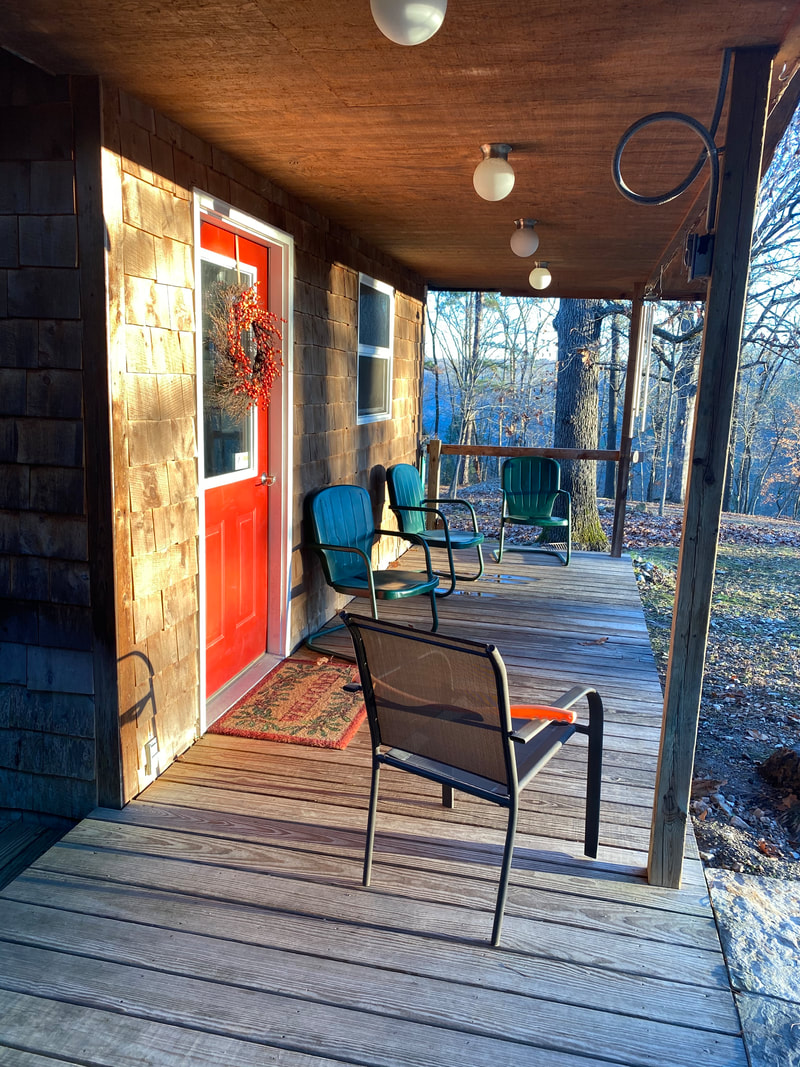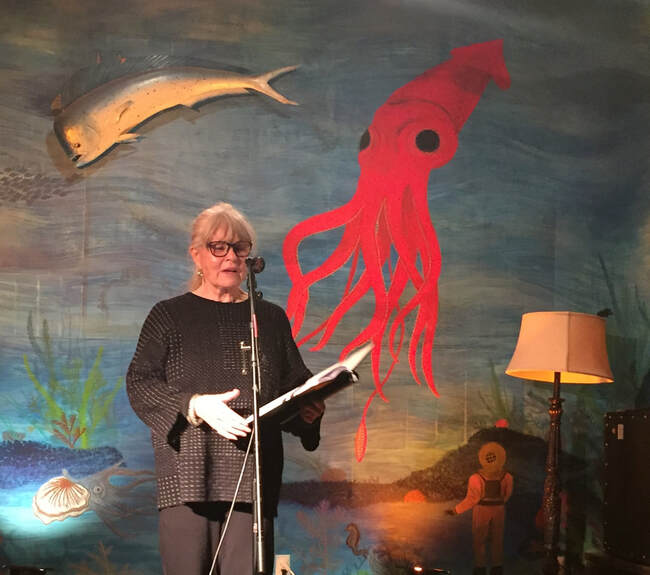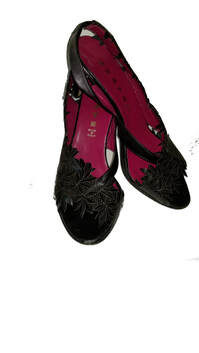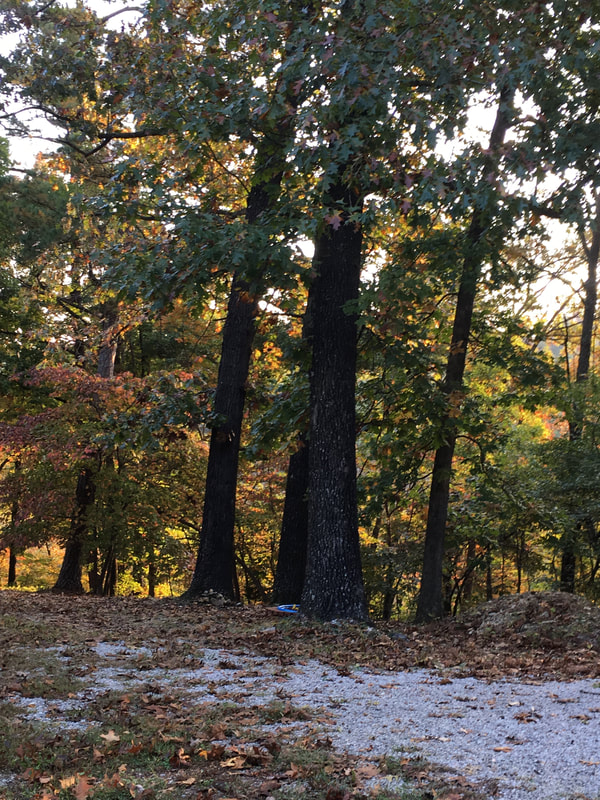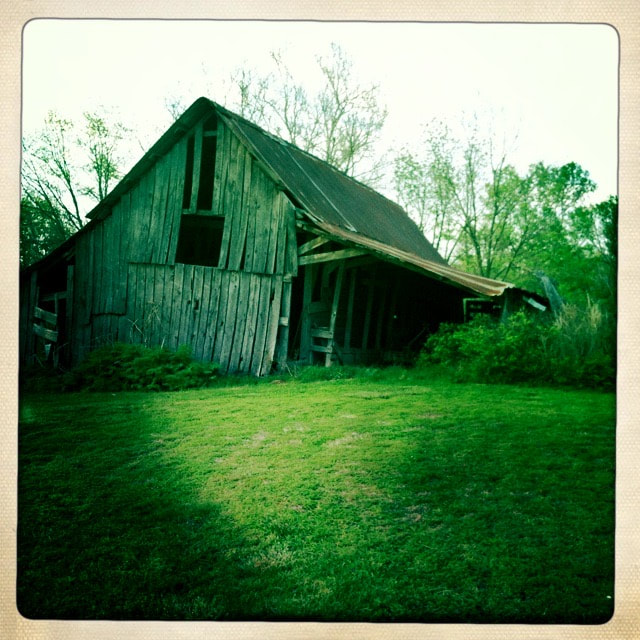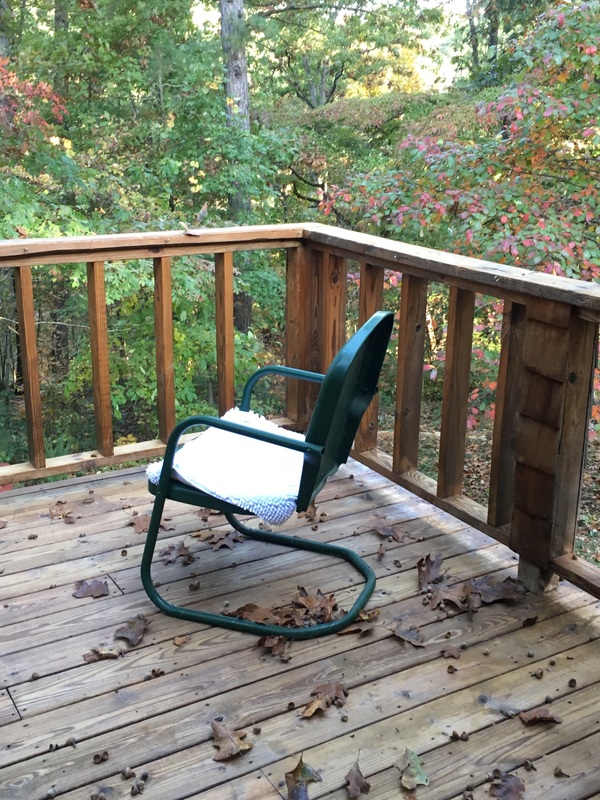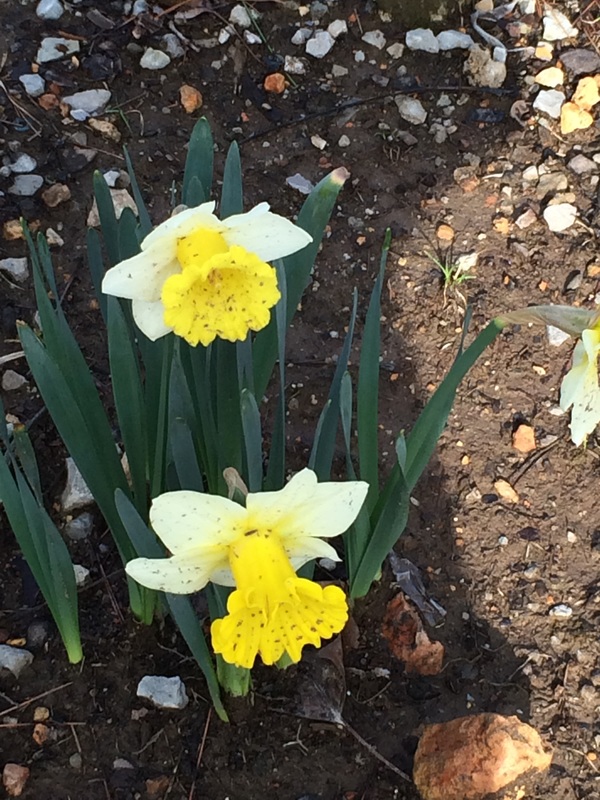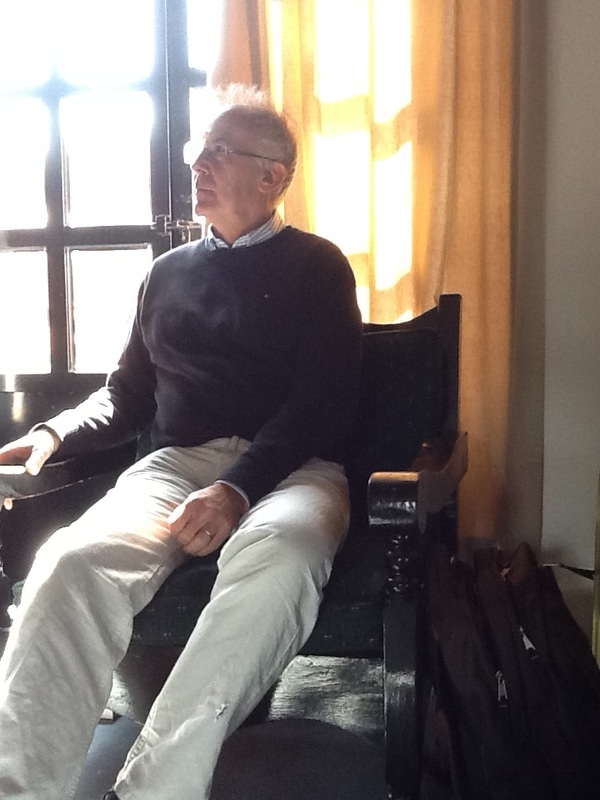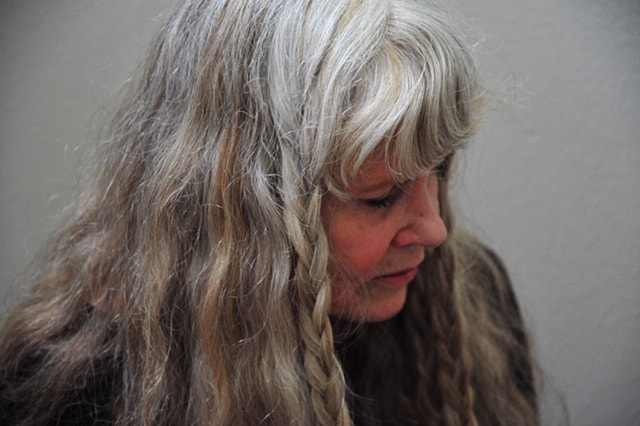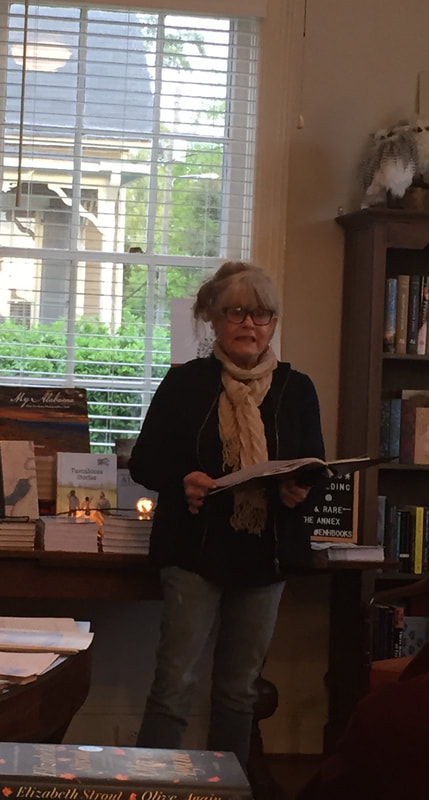 Ernest and Hadley Bookstore in Tuscaloosa is one hundred sorts of delightful. The books are curated brilliantly (yes, even the poetry)—plus there is an annex (an annex!!!) with used and rare books and chairs to read them in. I wanted to curl up and stay for a while longer. You can see, I’m already letting my hair down, but the Saints were on their way elsewhere…. Rolling with the Unlikely Saints10/23/2019 0 Comments The Saints began their journey October 17, in Birmingham, Alabama at the delightful arts venue Desert Island Supply. Gratitude goes to Executive Director, Brain Connell and his assistant Elizabeth for making us comfortable in a venue filled with surprising and delightful work by the students who come here to learn writing. They meet weekly during the school year to hone their literary skills. At sunset, heat goes out of the mountains in a hurry, rumors blow into the leaves and the fireflies—what there are left of them—rise up out past the gravel pile where the forest begins in a tangle of kudzu and brush and third-growth trees that make up the woods beyond where humans are scarce as a hiccup, in the trees, an interruption to the fox and possum, deer and raccoon, out south of town where a committee of vultures rests in hiding waiting to do the city’s clean up while in the courthouse the Council mumbles about ditching the kettle of scavengers with loud sounds or searchlights or poison, wiping out the wake of buzzards who keep streets clean of carrion. I don’t know what to think, but I’m sure I’ve never seen an alderman clean up a slaughtered critter.
Committee: vultures resting in trees; kettle: vultures in flight; wake: vultures feeding. Mma Ramotswe sighed, “We are all tempted, Mma. We are all tempted when it comes to cake.” McCall Smith There are so many temptations. Even in Starbucks with its case full of cardboard treats made who- knows-how-long-ago, I find myself looking twice. I Admit it. I do. You probably do, too. And television. Knowing they put those late-night commercials on to tempt you to call Domino’s, my mouth waters. I call Dominos. I wouldn’t eat at Arby’s if I were starving but, ba, ba, ba, ba, bing the commercial for Arby’s meat is right there in my RAM ready to spill out onto and Arby’s counter if I’m not careful. For a fact, my Temporal Lobe is jammed with old food commercials and memories—past birthday extravaganzas, the time I was eight at the circus and my mother let me buy as much cotton candy as I wanted and I did. I remember that. I remember how sick that was. That was sick. But I did it again. Stroganoff can put me in bed with a bellyache. Did I stop eating it? You guess. Dopamine, serotonin and norepinephrine, the chemicals an addict is chasing when she gets high are also the chemicals released when we eat fat/sugar/salt in the proper combo. Lately I’m watching my intake. Although I have been cooking three family meals a day, give or take, for five decades, I distrust glossy food photos and cooking magazines. I skip the commercials on TV. My cookbooks sit lonely on the shelf. I am aware of food cues and being too tired because I may be too tired to exercise but I’m never too tired to eat. I’m moving toward becoming a vegetarian/vegan. But I have to admit I’m tempted. I’m tempted when it comes to cake. Dear L,
I believe there is no such thing as patience. I believe it is a myth propagated by the same people who told you to sit straight and keep your hands your lap and both feet on the floor. There is forbearance. There is love. There is getting through it. In my experience, patience is some legerdemain, some sleight of hand trick to quiet a too-active mind, some "thing" that bends us to life-on-life's terms and, as such is no bad thing but is not "the" thing. Reach, rather, for grace which surrounds you and for grit which you have in abundance and know that I, for one, will never tell you to "have patience." Rather, I will love you and wish you grace in these troubled times and send you what energy I can sneak to Canada across these ever-more-fortified-borders.
Just so you know what some of Arkansas looks like and can consider if you would want to save it.12/17/2017 Over a year has gone by and I've buried too many good friends, and struggled through the first year of this president and his fascist allies and still I have the inclination to say something about peace or at least about weaponing and what it means--amazing isn't it?
****************** “ “After an accident, everyone will be asking why we didn’t do something. We need to be asking these questions before it’s too late.” Mark Samuels What with the wars and rumors of war swirling around our heads during this holiday season and a president who threatens nuclear war as if it were his kid’s soccer game but with hellfire and blight, I thought I might say a word here about unintended consequences. Thumbing through the interweb yesterday, I found an article that would rattle my Aunt Sadie. I’ve always though I was safe in Arkansas. Who wants anything Arkansas has? But four decades ago, Arkansas evaded a nuclear holocaust at a missile launch complex just outside Damascus, Arkansas, 129 miles south from where I sit, previously oblivious, writing this. That September 18, 1980, David Powell dropped a nine-pound wrench socket into a missile silo during routine maintenance. It was an accident. It pierced the missile’s skin. He was twenty-one. Then the missile leaked. Do you know what hypergolic fuel is? I didn’t. Now I do and it’s explosive and flammable. On top of that leaking Titan II, sat doomsday in the form of the most powerful thermonuclear device ever on American soil up until then. For the next nine hours, airmen hustled to keep Arkansas from exploding along with that broken weapon, and spreading fallout on the lot of us. Keep in mind, this is Arkansas, from the Delta to hillbilly country, nothing to see here but some nature and one presidential library. In Arkansas, we aren’t tactical. We are backward. Our Elected officials are, for the most part, rabidly conservative. We have no oil, nothing you would want but some water we have to fiercely protect. So I guess it seemed OK to put Ragnarok in our backyard. They do it out west all the time. But when I found this out, it spun me. Now I go about my chores—plant in spring, tend the garden in summer, harvest in fall, rest in winter. In every season, I know I am my own enemy, sitting on silos, sitting on nuclear waste, on explosive debris, on a missile I didn’t know was there. On the deck, before the dawn chorus, I rise to write and to imagine all the knowledge stacked and shelved in the minds of scholars now dead—the facts I’d give my life to know, the facts they gave their lifetimes to acquire. The men and women who lived as if books mattered, as if Tolstoy, Goethe, Balzac, the others, gave a special solace not found elsewhere, as if a multitude might go comfortless of nouns without the “thumb” and “fist” and “pastry” of their mother tongue, without the husk of a book from their hazy grand uncles’ libraries.
The uncles have vanished now, their language gone, gone the desire for dialect, patois, the je n’sais quoi that set the aunts at their escritoire in the morning to write their thousand letters, most all of them lost because we who came after didn’t understand the difference between culture and wisdom, between be and do. Or perhaps we lost our belief in the power of language except as twisted to the uses of propaganda. Even as I live past the post-war flush when the nation forgot how to read in the radium light from the blown up desert, forgot how to write because phones talked to us and answered us and TVs took our collective eyesight, live into the time when trunks of books went only to the junk dealers and thrift shop still the people I love best are writers are artists and scientists in love with language and still I rise to the world and to write before the woods stir. I don’t need to believe. I read and write and I only sometimes wonder why. This has been quite a season for loss. Natalie Cole, David Bowie, Alan Rickman, Harper Lee, Pat Conroy, George Martin, Merle Haggard, Patty Duke, Grizzly Adams, one of the Mondavis, one of the Eagles and more—all dead so far in 2016. And since death is often, if not always, on poets’ minds, I offer a poem from my first book, Reading Berryman to the Dog, on just that subject.
Seasonal Losses Passing last summer’s weathered hay, the tires splash on blacktop as fall rain shingles off an umbrella, weeps from the cupola, makes a cool counterpoint to the zealous blooming in my friend’s head, the malady that sets a milk carton on a lit stove, shuffles into the garden, naked as a rosebush. It won’t be long now. The dead this fall—their absolute numbers-- heavier than I thought, than brush piled against the fence, their particular faces reduced to one skeletal face, as all that was supple, extra is pared away until their passing requires only someone to sit and watch the scant twist of flesh from which inclination departs. Driving into the fast-growing tumor of the city, winter rye sprouting in the sidewalk cracks, a quick explosion of chill shucked knees and elbows, I leave behind remaindered dirt-- beyond recognition, all that’s left of fall-- the damaged stone, the austere moons of their nails. I wake later now, the big dog insistent at the covers. I write less. Longhand aches. I remember Naomi explaining how, like her teacher, she stole the early morning from her hectic day, wrote into it the wonder of a windowsill in first light. When my back windows looked out on a fence and a landscaped bit of green I woke with her injunction and wrote the sun up.
This morning’s oak and pine, dogwood and sycamore are gray and black and branchy against the hillside just showing splashes of daffodils and green dogwood blossoms while here and there a few brown leaves still cling like memories and downed timber is visible in the unleafed woods lying like corpses in last year's duff. In such natural disorder, I sleep late until what sun there is has cleared the eastern gully and I’ve killed some working hours with sleep. But I'll do better. I await an early sunrise and an early me-rise and time to think line by line. THE DAY I GAVE UP POLITICS
I know who the bad guys are I know that. I read. Don’t you think I read? And I ask for a paper ballot Because you know how “they” are. And I try not to feel smug Because you know how I am. And I wait to be disappointed again. To wake with my dragging feathers & my furrowed forehead, wake with my questions: What don’t we vote our fiscal self-interest? They vote theirs? Why don’t we care? Why do we give away power While we’re still broke and at war? I wrote this after the 2012 mid-term elections—and let it lie. I admit to a bleak view. But then Eurekans in the Save the Ozarks group beat back a push by SWEPCO to plant high voltage power lines across our ‘natural’ part of the state and then this morning Eureka Springs, Arkansas woke up to the hum of victory! (Check out the Arkansas’ Times Blog at this tiny URL http://tinyurl.com/p7mmj78 Yesterday 792 of us—of them, really, because although I donated and talked and supported, I live outside the city limits & only the city dwellers could cast ballots—-voted for nondiscrimination, for having no place in our city for prejudice against LGBTQ folk and for adding them to the list of groups Eureka protects. And yes, as we milled around on Spring Street after the votes were counted some angry “no” voters drove by. And yes, hate on the hoof can be scary. But the town said loudly and happily—with hoots n’ shouts that—YES, YES,YES we’re for equality—for everybody. Good goin’ Eurekans! May 12, 2015 Blog III: Thinking of Tomaž
Tomaž Šalamun was born on the 4th of July, 1941 and left the world of poets this past December 27. I met him several times during the 6 trips I made to Slovenia in the first decade of the century. He was always present, in person and not, in Slovenia. His history (in poetry and life) and the history of the nation intertwined. He spoke to my summer residency group in Bled; I was at a workshop with him in Dallas; we were at Vilenicia Literary Festival. In my experience, he was never less than gentle and encouraging, a poet’s poet and a teacher who granted his students a place at the poetry table. I miss him. In 2012, around The Feast of the Three Kings I was in San Miguel at Jennifer Clements’ the Writer’s Week with the amazing Tomaž. He showed up at that cobblestoned and hilly town with a bad back and high spirits and never complained. For a look at that workshop and the poet, check out this remembrance by Christopher Merrill. (oh do it—it’s beautiful and contains a bit about Šalamun’s “Eclipse,” an early and delicious poem.) http://www.huffingtonpost.com/christopher-merrill/remembering-toma-alamun_b_6391256.html I will take nails, long nails and hammer them into my body. Very very gently, very very slowly, so it will last longer. I will draw up a precise plan. I will upholster myself every day, say two square inches for instance. Then I will set fire to everything. It will burn for a long time, it will burn for seven days. Only the nails will remain, all welded together and rusty. So I will remain. So I will survive everything. At that same workshop I handed him a copy of this poem, which he pronounced, “a perfect poem” but, he added, no one in America will publish it. I have submitted it about a dozen times and so far no one has—so, because I’m thinking of Tomaž today, I’m putting it here. On Art Art never lets anything be. Art walk us a- way. Learn every- thing about art but what dampens your love for it. Your art must change reality to become art, until then it’s just subconscious material. Only fire and murder can interrupt art. An addiction demands its due. To have a peace- ful death, you must make all the art you want, even if you wouldn’t make it twice. Wendy Taylor Carlisle For more on Tomaž life and writing career. http://www.sloveniatimes.com/acclaimed-poet-salamun-die Down to the lick log of summer, on a perfect September afternoon almost at the autumnal equinox—Clean. Blue. Cool, not too cold—I am urged to write about hot weather.
To write about Arkansas summer you have to have the animal memory of swelter, of low water, of dry sumps, of deer come close to the cow pond, of NO BURN signs everywhere. Years ago during the hottest summer on record, Phoenix simmered to a boil in its lovely tarmac, a bubble away from heatstroke, everywhere they were preaching Armageddon and using 115 degrees for proof. That year, in the mountains with no air condition it was too hot to sleep close even with fans at the head and foot of the bed. Before 11am and after midnight you could be in the house. Apart from those hours, we stayed away as long as we could. Glory be for Harts’ grocery store, where we pushed a wire cart through the cans and bottles—15 minutes to choose a sponge, ½ hour for a soft drink chilled straight out of the cooler box. The hottest summer since Satan fell or so we thought. It sweated us. It may be that we were brown and swam it. May be that when we could, we stepped down from the cliff into the icy river water imagining ourselves Cherokee just passing through or Quapaw or settlers, learned long ago to make some peace with the heat. Winter was a rumor that summer. We searched for something cold and what we found was never cold enough. [The phrase "down to the licklog": slang relating to the second-to-last thing some cattle were made to do before they were slaughtered. It was an old rancher trick to take them to the salt lick and then to water to increase the weight before slaughter.] This is the blog I swore I would never write because it would steal too much time from writing poetry. Then a friend suggested that I could use it to recommend books and post favorite quotes and pictures. That didn’t seem time-consuming. So here is the first post.
Nine Years After It’s been nine years and a couple of weeks since Katrina blasted ashore in NOLA where my son lived in a converted bar in the 9th ward. I remember the days during and after as a scuffle of worry as our son was trapped in the city, lost, then found but what I remember after that was a trip to dig out what was left of his goods, gear, tackle and trim from a devastated city that resembled Beirut in 1990 more than its jaunty pre-storm self. September, 2005, Oh Yes Jesus Driving in, we’re stunned by then-novel sight of houses with their tide lines, sidewalks crammed with bagged garbage, refrigerators stinking in the sun, their doors jawed open, a city bus abandoned in the median on St Cloud. We make our way through the semi-deserted streets to the apartment where we are hailed by some remaining neighbors come along to greet us. The stringy bicep, the tobacco-stained tooth and the rakish grin of America’s gulf coast surround us with this great city’s vernacular of hand-in-hand. Driving out hot and tired we retreat through the patrolled neighborhood taking with us our admiration for the stubbornness and returning joy of people who weathered it out, buoyed by the sound of gospel music from a house nearby, a full tabernacle choir wailing, someone chanting “Oh yes, Jesus. Oh Yes!’ |
Wendy Taylor CarlislePoet in the Ozark woods. Archives
February 2021
|
